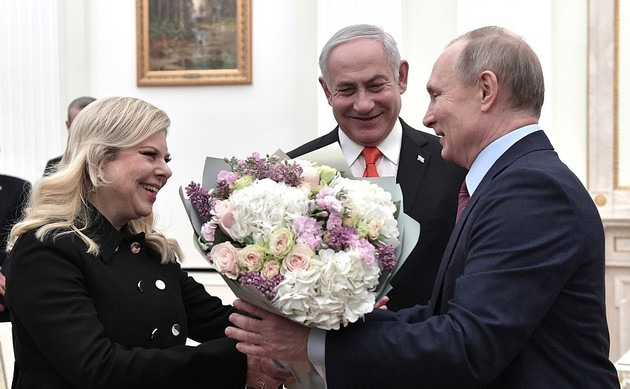Israeli Prime Minister Benjamin Netanyahu paid a short visit to Moscow. He shared with the Russian President Vladimir Putin a full Israel-Palestine Peace Plan proposed by the U.S. and discussed the situation in the region. The Israeli Prime Minister’s plane left Moscow with a new passenger on board - Naama Issachar, who was pardoned by Putin.
Convicted and serving a prison sentence in Russia for smuggling 9.5 grams of hashish, an Israeli citizen was released. Meeting the other day at Netanyahu’s residence with Naama’s mother, Putin assured her that "everything will be fine." Everything worked out well for an Israeli girl - she was pardoned by presidential decree.
Now the Israeli Prime Minister wants everything to work out well for him either as a result of the third early parliamentary elections in a year. The competition with former chief of the Israeli military Benny Gantz is fierce. The slightest success is as valuable as gold. The slightest failure is comparable to disaster. Netanyahu is playing both sides. He demonstrates to his people "great relations" with Washington, taking the 'deal of the century' from there, and taking a concrete citizen that got into trouble from Moscow, showing off his care for every ordinary citizen of Israel.
The "second part" of Benjamin Netanyahu’s plan and actions is clear, transparent, everything is in sight. The 'Deal of the Century', of course, needs clarification, analysis, and an attempt to figure out where it was going when Donald Trump's ambitions to an end to the bloody long-standing conflict in the Middle East start coming up.
In short, Washington's Palestinian-Israeli conflict settlement plan is based on the "three pillars": first, two independent states are created — the Jewish and the Palestinian; the Jewish capital is Jerusalem, the Palestinian capital is East Jerusalem; Palestine is expanding its territory and receiving up to $50 billion for development.
Donald Trump's proposals filled Benjamin Netanyahu with enthusiasm. He did not even hesitate to call the U.S. president "the greatest friend that Israel has ever had."
In contrast to the Israeli prime minister, the Palestinians have different sentiments - they want to increase the territory of their state not partially, as the plan suggests, but to the fullest extent possible, i.e. returning all the lands which, in their opinion, were annexed by Israel. Palestinians are also unhappy that they will not have the whole of Jerusalem, and Jewish settlements will remain in territories that to be returned.
A CNN commentary says that Trump’s plan is actually capable of forcing the Palestinians to give up their hope to establish their state in the West Bank and Gaza - there are Israeli settlements everywhere that are even connected by tunnels and not mentioned in Washington's suggestions. "The idea looks like an attempt to legitimize the territories that the UN considers occupied by Israel," the commentary says. The fact that Trump’s plan is unacceptable for Palestine is evidenced by the remark of Palestinian President Mahmoud Abbas on the $50-billion infusion into the economy when signing the proposed agreement: "$50 billion - our rights are not for sale."
In the light of the Palestinians' rejection of Trump’s plan, the question arises - why did the U.S. president take such a risky step that is unlikely to strengthen or increase his authority on the international stage. According to analysts, it was the internal situation that pushed the president to a "dangerous game". He needs to distract attention from his own person at a time when the issue of impeachment is being decided, and at the same time ... remain in the spotlight.
Then why it was necessary to make the plan public that would most likely be rejected by Palestine, and not to develop something more digestible for them and acceptable to Israel to about the same extent as the proposed "deal of the century" . Well, or a little less.
The answer is the 2020 presidential election. Having played on the Israeli side, Donald Trump hopes to get votes in the "evangelical states" - Iowa, South Carolina, Texas, Tennessee, Georgia - where, for religious reasons, the positions of the Jewish state are strong.
Perhaps after Netanyahu briefed Putin on Trump’s plan, demonstrating virtually the same degree of trust in Washington and Moscow, Russia may enter the game. Or maybe such openness of the Israeli PM should be regarded as a legal proposal to Russia - not to stay away from the "deal of the century"?








